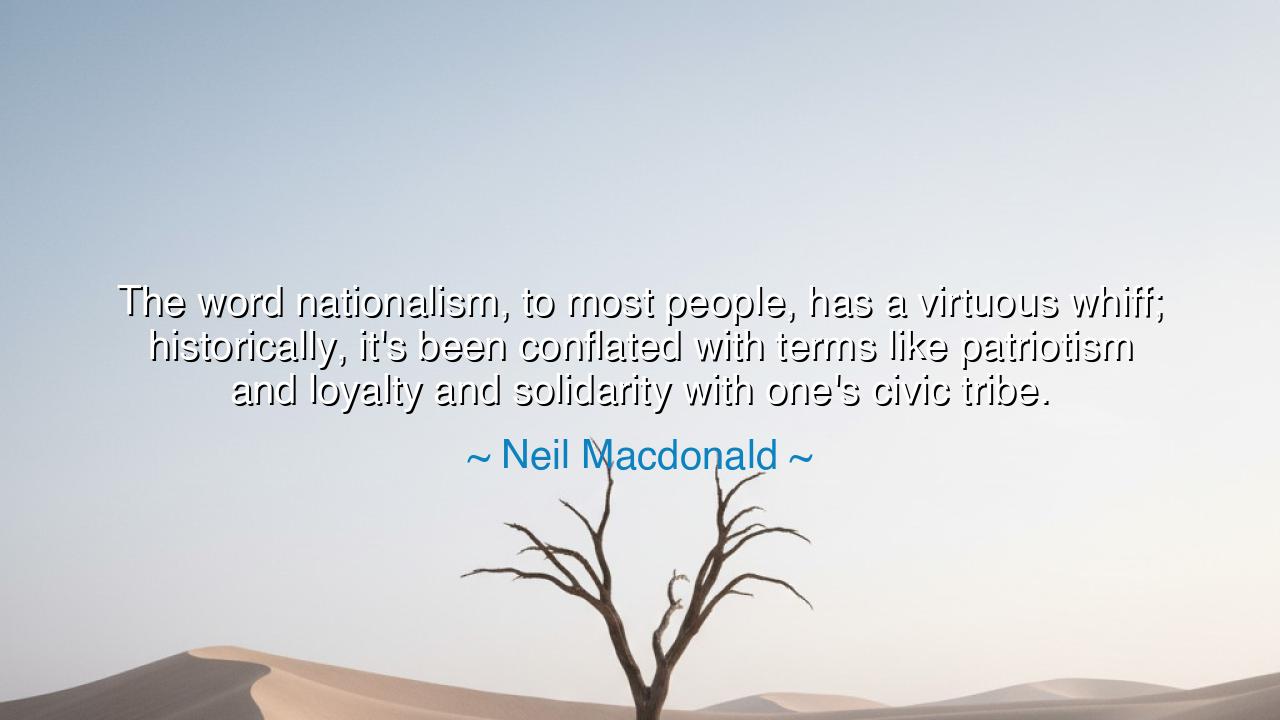
The word nationalism, to most people, has a virtuous whiff;
The word nationalism, to most people, has a virtuous whiff; historically, it's been conflated with terms like patriotism and loyalty and solidarity with one's civic tribe.






Neil Macdonald, the journalist and commentator, once observed with piercing clarity: “The word nationalism, to most people, has a virtuous whiff; historically, it's been conflated with terms like patriotism and loyalty and solidarity with one's civic tribe.” In this statement, he unmasks the power and peril of language. For the word nationalism, though rooted in shared belonging, often cloaks itself in the noble garments of patriotism, loyalty, and solidarity. To many, it seems a virtue, for it stirs the heart to stand with one’s people. Yet history teaches us that when confused with these nobler sentiments, nationalism can become a fire—warming the hearth when contained, but devouring nations when let loose.
The origin of this observation lies in the long history of political rhetoric. For centuries, rulers and leaders have drawn upon the language of patriotism to bind their people to a cause. Patriotism is love of one’s land, a devotion to home, a readiness to defend it. But nationalism, especially in its extreme forms, is something more demanding: it demands not only pride in one’s own, but often disdain for others. By pointing out the conflation, Macdonald warns us of the subtle shift where virtue can turn into vice, and where solidarity becomes exclusion.
History offers us vivid examples of this confusion. Consider the unifying cry of the French Revolution. The people rose in the name of liberty, equality, and fraternity, moved by patriotism and solidarity with their civic tribe. At first, their nationalism was a banner of justice, a breaking of chains. Yet, over time, it hardened into excess—fueling wars across Europe and a fervor that sometimes devoured its own children. What began as a virtuous whiff of shared destiny became a force both heroic and perilous.
Or recall the story of Germany in the 20th century. After the humiliation of defeat in World War I, nationalism carried the fragrance of loyalty, pride, and recovery. But as it grew unchecked, conflated with patriotism, it was twisted into a weapon of hatred and destruction under the Nazi regime. Here we see Macdonald’s words made flesh: what began with the language of loyalty to the tribe became a furnace that consumed millions. It is a solemn reminder that the line between noble patriotism and dangerous nationalism is thin, and must be guarded carefully.
Yet we must not forget the noble side of this conflation. Solidarity with one’s civic tribe has also produced movements of liberation and unity. In India, the cry for independence was rooted in both nationalism and patriotism. The leaders of that struggle—men like Mahatma Gandhi—called their people not only to resist oppression but also to live in harmony, binding millions together in shared sacrifice. Here, nationalism carried the scent of virtue because it was directed not toward domination, but toward freedom and justice.
The deeper meaning of Macdonald’s words is this: the language we use shapes the spirit we follow. When we speak of nationalism, we must ask whether we mean the love of country that embraces responsibility and justice, or whether we mean an idol that demands blind obedience and contempt for outsiders. Words carry power, and the conflation of patriotism, loyalty, and nationalism can inspire greatness or unleash ruin.
The lesson is clear: be vigilant in your understanding of these words. Do not let the noble fragrance of patriotism mask the darker fumes of exclusionary nationalism. Love your land, honor your people, and stand with your community, but never forget the humanity that binds all tribes together. Solidarity must not end at borders, and loyalty must not blind the eyes to justice.
So remember, children of tomorrow: nationalism may carry the whiff of virtue, but it is not always the same as patriotism, loyalty, or solidarity. Discern carefully, guard your heart, and let your devotion to country be one that uplifts rather than destroys. For true patriotism is not hatred of the other, but love of one’s own, expressed with humility, responsibility, and justice. And in this balance, nations may endure not as flames of conquest, but as lights of hope to the world.






AAdministratorAdministrator
Welcome, honored guests. Please leave a comment, we will respond soon